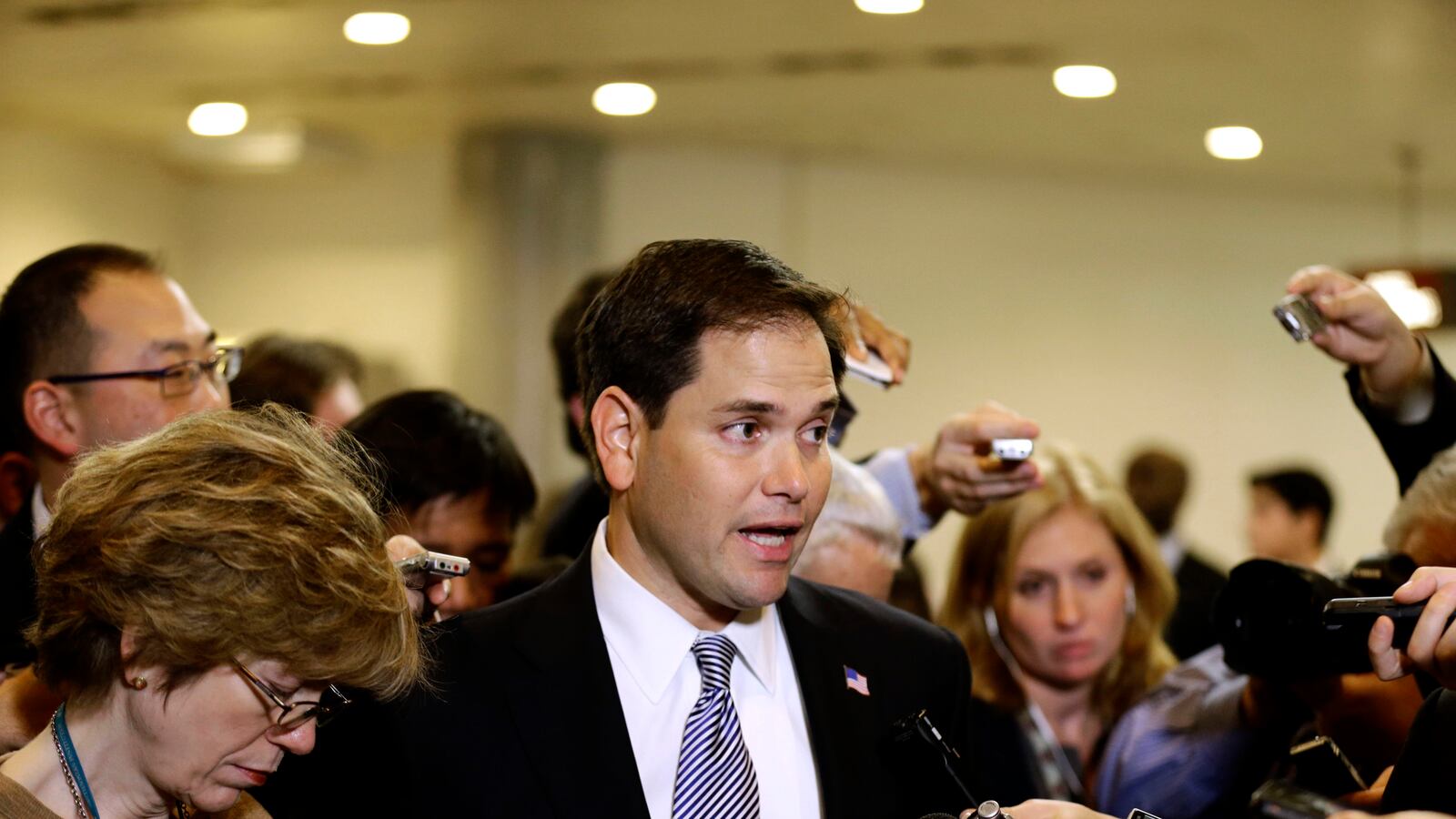
On Sunday, Marco Rubio published an op-ed in a Las Vegas newspaper entitled “A GOP Vision for Immigration Reform.” On Monday he stood alongside Senate old lions like Chuck Schumer and John McCain to announce a comprehensive immigration reform bill, then went on the TV show hosted by Sean Hannity, who called the measure “the most thoughtful proposal that I have heard, and you have explained it better than anybody.” Tuesday brought an interview with Rush Limbaugh, who only the day before had declared that defeating the measure would fall almost exclusively on his shoulders, but on the phone with the youthful Florida senator the right-wing talker called the measure “admirable and noteworthy.” “That was quite impressive!” Limbaugh said after the interview was over. “He stayed on point, he stayed on message, and he believes it!”
Rubio has been called the GOP’s Obama ever since he rode a Tea Party wave into an upset victory in the Florida Senate race in 2010. But now, with the GOP reeling from November’s election losses and determined to reach out to Hispanic voters, Rubio’s moment may have at last arrived, as both Democrats and Republicans push a comprehensive immigration reform bill.
And it is a moment that comes with more than the usual share of promise and peril. Although party leaders have been urging the GOP to broaden its appeal to Hispanics, there remains considerable opposition to anything that reeks of amnesty among the grassroots.
“There are Republicans who will tear up their Republican voting cards over this,” said Dan Stein, the president of the Federation for American Immigration Reform, which opposes the bill.
Rubio is widely considered to be among the party’s top-tier contenders in 2016, but this wasn’t necessarily a fight he needed to be involved in. Not only does the effort contain the chance of angering hardcore primary voters, but Rubio, the son of Cuban exiles, would be able to get Hispanic voters and those pushing for a more moderating voice on immigration within the party merely by his presence.
“Rubio has tried to neutralize [the anger on the right] because of the credibility he has with Tea Party folks, but once real measures are put down in black and white you are going to see the bloggers and talk-show hosts on the right become less and less polite,” said Mark Krikorian, the director of the Center for Immigration Studies, which is devoted to limited immigration. “Rubio’s stock among conservatives is going to start going down over the next six months, and I think he has pretty much doomed his chances for 2016.”
But for immigration reform to have a chance, backers needed Rubio precisely because of the credibility he has with the furthest reaches of the conservative movement, as witnessed by the fawning treatment he received from right-wing gatekeepers like Limbaugh and Hannity.
When asked what makes this immigration effort different from the one in 2007 championed by George W. Bush but defeated by grassroots conservative opposition, Colin Hanna, the president of the conservative activist group Let Freedom Ring and a GOP powerbroker, said simply: “The addition of Rubio.”
“Rubio has shown that he has the intellect and the leadership skills to bring this off better than anyone. His involvement moves this effort from the impractical to the practical,” he said.
In 2012 Mitt Romney took a hard line against illegal immigration, saying during the GOP primary that a restrictive crackdown would cause the undocumented to “self-deport.” The phrase dogged him, and he ended up losing the Latino vote by 45 points amidst record turnout.
Now, if Rubio can lead the party to a new place, Republican insiders say, he will deserve the early accolades as being the one who finally let the GOP move on from the nativist sentiment that has dogged them the past two election cycles. Get immigration done and the party will be able to compete again on bread-and-butter issues with most of the electorate.
“It’s an issue whose half-life has already been exhausted,” said Douglas Gross, a political operative in the early-primary state of Iowa. “There are other issues on people’s mind. That’s why this is smart on Rubio’s part. Part of being seen as the next generation of leadership is taking on an issue that leads the party to a new place. If he wants to be seen as a leader, that is what he has to do, even though this isn’t really that tough of an issue.”
Rubio is assuaging worried conservatives by talking up the extra border security that will come with the bill, and assuring them that “amnesty” will come only to those who have paid their taxes and get to the back of the line.
“Rubio has been calling it ‘earn-esty,’ not ‘amnesty,’ and that’s the difference between then and now,” said Chad Connelly, the chairman of the South Carolina Republican Party, which in 2007 was tepid on Bush’s effort. “People are looking to him. He’s got the Latino background, so they want to find out his take.”
Rubio already has criticized Obama’s Las Vega speech, saying it was too light on enforcement. If this push fails, Rubio will be able to go before conservative audiences for the next four years as the person who insisted on securing the border only to be stymied by a Democratic president. But if it succeeds, he will have achieved something beyond what Obama did when the first-term Illinois senator decided to run for president—an actual, real legislative achievement.
“We know we need to stop being the party of ‘no-no-no,’” said Alex Patton, a political consultant in Florida.
As for any conservatives angry at Rubio’s apostasy?
“They will get over it. Conservatives will reach a point where they are tired of losing on the national level and on the state level and they will get it over it.”






